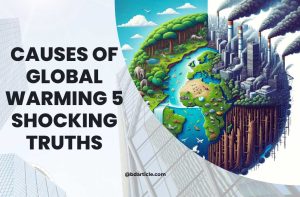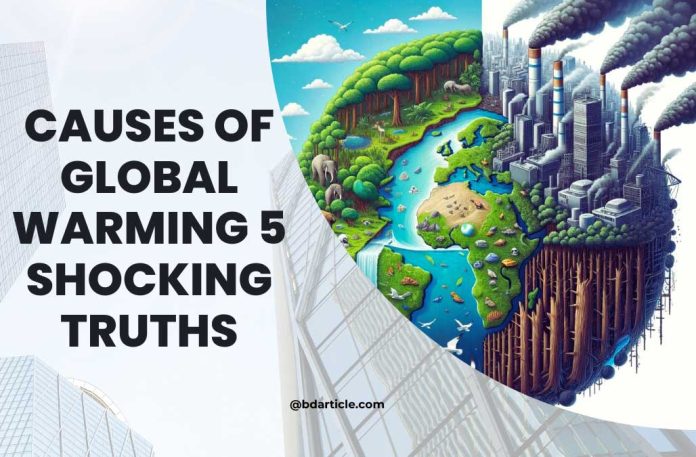The causes of global warming are among the most pressing issues of the 21st century, posing serious threats to ecosystems, weather patterns, and human lives. Global warming refers to the gradual increase in Earth’s average surface temperature, driven largely by human activities and natural factors. Understanding these causes is crucial to mitigating the problem and ensuring a sustainable future for all life on Earth.

Global Warming Definition: What Does It Mean?
Global warming is the long-term heating of Earth’s climate system, primarily due to human activities such as burning fossil fuels and deforestation. According to NASA, the planet’s average surface temperature has risen by about 1.1°C (2°F) since the late 19th century. The overwhelming consensus among scientists attributes this rise to the excessive buildup of greenhouse gases in the atmosphere.
These gases, including carbon dioxide (CO₂), methane (CH₄), and nitrous oxide (N₂O), trap heat from the sun, creating a “greenhouse effect.” While the greenhouse effect is essential for maintaining a habitable climate, its intensification due to human actions has triggered global warming.
What Are the 3 Main Causes of Global Warming?
The three main causes of global warming form the backbone of this phenomenon. They are:
- Burning of Fossil Fuels: The combustion of coal, oil, and natural gas for energy is the largest contributor to greenhouse gas emissions. Power plants, factories, and vehicles release billions of tons of CO₂ annually into the atmosphere.
- Deforestation: Forests act as carbon sinks, absorbing CO₂. When trees are cut down for agriculture or urbanization, this CO₂ is released back into the atmosphere.
- Industrial Emissions: Factories emit not only CO₂ but also other potent greenhouse gases like methane and fluorinated gases during manufacturing processes.
These primary factors interact with other human and natural elements to exacerbate global warming, making it a multifaceted issue.
5 Causes of Global Warming That Will Shock You
While the major contributors are well-documented, there are lesser-known causes of global warming that can leave you stunned:
- Livestock Farming: Cows and other livestock emit significant amounts of methane, a greenhouse gas 25 times more potent than CO₂. The agriculture sector contributes approximately 14.5% of global greenhouse gas emissions.
- Waste in Landfills: Decomposing waste in landfills releases methane. The increasing amount of waste generated globally has made landfills a surprising but significant source of emissions.
- Overuse of Fertilizers: Synthetic fertilizers release nitrous oxide, which is nearly 300 times more effective at trapping heat than CO₂.
- Air Travel: Commercial aviation emits large quantities of CO₂ and water vapour at high altitudes, intensifying the warming effect.
- Melting Permafrost: As permafrost in Arctic regions thaws, it releases trapped methane and CO₂, creating a feedback loop that accelerates global warming.
These hidden culprits highlight how human activities across various sectors are contributing to the planet’s alarming warming rate.
10 Causes of Global Warming
When exploring the 10 causes of global warming, you’ll notice the wide-ranging influence of both human activities and natural processes. These include:
- Burning fossil fuels
- Deforestation
- Industrial emissions
- Livestock farming
- Landfill waste
- Air travel
- Overuse of fertilizers
- Thawing permafrost
- Urban heat islands (cities trapping heat due to concrete and asphalt)
- Volcanic eruptions (though minor compared to human causes)
Together, these factors contribute to the planet’s rising temperature, disrupting ecosystems and weather systems.
Causes of Global Warming in Points
Breaking down the causes of global warming into concise points can help simplify this complex topic:
- Excessive carbon emissions from power plants and vehicles
- Agriculture-driven methane emissions
- Loss of forest cover reduces carbon absorption
- Industrial processes release fluorinated gases
- Accumulation of methane in landfills
- High dependency on fossil fuels
- Climate feedback loops like melting ice and permafrost
Each point underscores the interconnected nature of human activities and their environmental impact.
Effects of Global Warming: A Ripple Effect
The effects of global warming extend far beyond rising temperatures. Here are some major consequences:
- Extreme Weather Events: Global warming has intensified hurricanes, droughts, floods, and wildfires.
- Rising Sea Levels: Melting polar ice caps and glaciers are raising sea levels, threatening coastal communities.
- Biodiversity Loss: Changing climates have led to habitat destruction, endangering species.
- Health Risks: Heatwaves and the spread of vector-borne diseases are endangering human health.
- Economic Impact: Natural disasters caused by global warming result in billions of dollars in damages annually.
These effects underline the urgency of addressing the causes of global warming.
5 Shocking Effects of Global Warming
To further drive home the gravity of the situation, here are five jaw-dropping effects of global warming:
- Sinking Cities: Coastal cities like Jakarta and Miami face the risk of submergence due to rising sea levels.
- Ocean Acidification: CO₂ absorption by oceans is making them acidic, endangering marine life.
- Wildfire Surge: Prolonged droughts and higher temperatures have turned wildfires into a global crisis.
- Ice-Free Arctic Summers: Predictions suggest the Arctic could be ice-free during summers within decades.
- Mass Migration: Climate refugees are increasing as rising seas and desertification displaces populations.
Each of these effects illustrates why tackling the causes of global warming is essential for the planet’s survival.
Renewable Energy Projects for Communities
One promising solution to counter global warming is investing in Renewable Energy Projects for Communities. These projects harness wind, solar, and hydropower to replace fossil fuels, providing clean, sustainable energy. They also empower local communities by reducing energy costs and creating jobs, making them a win-win solution for people and the planet.
What Can Be Done to Address Global Warming?
Combating global warming requires a combination of individual actions, corporate responsibility, and governmental policies. Steps include:
- Transitioning to renewable energy sources like solar and wind.
- Reducing meat consumption to limit methane emissions.
- Advocating for reforestation and afforestation projects.
- Implementing stricter regulations on industrial emissions.
- Promoting energy-efficient technologies and practices.
Individual efforts, such as carpooling, recycling, and conserving electricity, also play a vital role in reducing the causes of global warming.
Conclusion
Understanding the causes of global warming is the first step toward solving this crisis. From fossil fuel combustion to methane emissions from livestock, each factor contributes to the rising temperatures and alarming effects we see today. But with Collective Action, innovation, and commitment to sustainability, we can mitigate these causes and secure a brighter future.
FAQs
- What are the three main causes of global warming?
The three main causes are the burning of fossil fuels, deforestation, and industrial emissions. - What are the effects of global warming?
Global warming causes rising sea levels, extreme weather events, biodiversity loss, and health risks, among others. - How does livestock farming contribute to global warming?
Livestock farming emits methane during digestion, and its impact is 25 times greater than CO₂ in trapping heat. - What are the five causes of global warming?
Five major causes include burning fossil fuels, deforestation, livestock farming, landfill waste, and overuse of fertilizers. - Can renewable energy reduce global warming?
Yes, renewable energy reduces dependence on fossil fuels, significantly lowering carbon emissions. - What is global warming’s impact on biodiversity?
Global warming alters habitats, forcing species to migrate or face extinction due to changing conditions.
#Causes_of_global_warming #Effects_of_global_warming #Global_warming_definition

